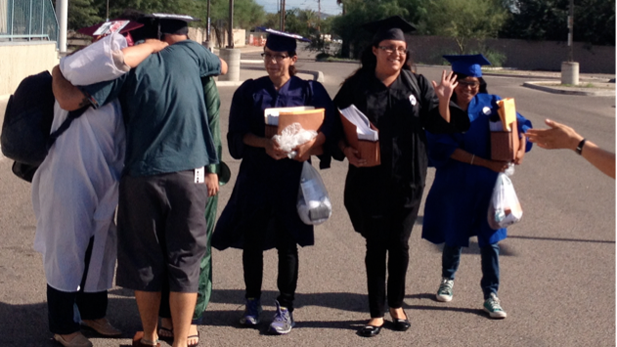 Several of the nine "dreamer" activists freed at the Tucson Greyhound station after three weeks in custody.
Several of the nine "dreamer" activists freed at the Tucson Greyhound station after three weeks in custody.Nine "dreamers" walked to freedom Wednesday at the Tucson Greyhound bus station just as they walked into custody last month - wearing their high school graduation caps and gowns.
Now they will await hearings on their requests for political asylum in the United States, a process that could take years.
The nine activists were taken into custody July 22 after crossing into the United States at Nogales as part of a push by the National Immigrant Youth Alliance for immigration reform, to include a path to citizenship for those in the country without documents.
All nine were born in Mexico and brought to the United States illegally as children by their parents at various times. All the "dreamers," so named for the proposed DREAM Act that would give them and thousands like them legal status, returned to Mexico to press their point.
 Maria Peniche, 22, released Aug. 7, 2013 with eight other 'dreamers.'
Maria Peniche, 22, released Aug. 7, 2013 with eight other 'dreamers.'They wore caps and gowns as an expression of their American upbringings, where they were educated.
They were greeted by friends and other activists.
"We weren't sure what was really going to happen, but it did. It did," said Maria Peniche, 22. "We are all very excited and very happy to be home."
She was born in Mexico and moved to Boston when she was 10. Her parents feared being deported, so they moved back to Mexico. Three days later the Obama administration announced the deferred action plan, which would allow Peniche to work legally in the U.S.
She and other activists said they believe the group’s successful bid to have their cases heard may encourage hundreds of others in Mexico to try the same: present themselves at the border and ask for asylum.
But Peniche said she is worried that a judge may ultimately turn down her appeal for asylum and thus she would be sent back to Mexico.
Only a small percentage of Mexican asylum cases are approved.
Lisbeth Mateo, 29, is one of three young people who self-deported three weeks ago to join the other six who were already in Mexico. She has no regrets, she said.
"I was already at risk," Mateo said. "Being undocumented for so long, I was already at risk of being picked up."
Tucson lawyer Margo Cowan, who is representing the nine, said asylum cases she already is handling are taking five to seven years. But she said she hopes that will change.
"So maybe Congress will come to their senses," Cowan said. "And maybe there will be some decent changes made to our immigration laws."
That, she said, was the point the group was trying to make through this whole confrontation.

By submitting your comments, you hereby give AZPM the right to post your comments and potentially use them in any other form of media operated by this institution.